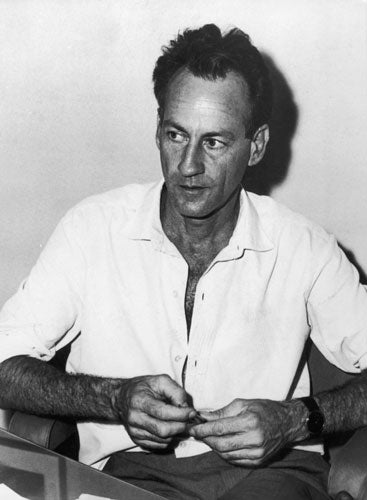Why France still rues the day we ruled the waves
The memory of Robin Knox-Johnston's record-breaking circumnavigation still rankles over the Channel. Amol Rajan reports on an acrimonious anniversary

Your support helps us to tell the story
From reproductive rights to climate change to Big Tech, The Independent is on the ground when the story is developing. Whether it's investigating the financials of Elon Musk's pro-Trump PAC or producing our latest documentary, 'The A Word', which shines a light on the American women fighting for reproductive rights, we know how important it is to parse out the facts from the messaging.
At such a critical moment in US history, we need reporters on the ground. Your donation allows us to keep sending journalists to speak to both sides of the story.
The Independent is trusted by Americans across the entire political spectrum. And unlike many other quality news outlets, we choose not to lock Americans out of our reporting and analysis with paywalls. We believe quality journalism should be available to everyone, paid for by those who can afford it.
Your support makes all the difference.When, 40 years ago this afternoon, Sir Robin Knox-Johnston arrived in Falmouth dock to become the first man to sail single-handedly and non-stop around the world, his entry into the pantheon of England's greatest naval adventurers was secure.
The only one of the nine competitors to complete the journey – seven others abandoned the race and one, Donald Crowhurst, committed suicide – Sir Robin's 312-day journey on a 32ft boat called Suhaili not only became the stuff of legend but inspired the creation of competitions dedicated to seafaring circumnavigation, including the Whitbread Round the World Race and Clipper Round the World Race.
And yet a faint whiff of controversy that attached itself to Sir Robin's feat lingers to this day. It surrounds the question of what happened to Bernard Moitessier, the Frenchman trailing Sir Robin who mysteriously pulled out of the race before completing it, saying he'd rather "save his soul".
To this day the French believe that Moitessier was the better sailor and would have been the true record holder if he had carried on to Falmouth.
But in a new book by BBC newscaster Chris Eakin, published to coincide with the 40th anniversary of Sir Robin's arrival in Falmouth, the record-breaker gives full vent to his fury.
"The French, who hate admitting that they are not winning, always maintained he was beating me when he pulled out, which is not true," he tells Eakin.
"What the French wouldn't admit is that I was three weeks ahead of him at Cape Horn, and they can't accept that. So I keep getting this thing that Moitessier was winning when he left the race. Well, winning what? I would have been two days ahead. He was not speeding up. I was speeding up. He wasn't. I was getting faster. But even ignoring that, if you take our averages up to that point, mathematically, I would have come in ahead.
"No one ever listens," Sir Robin continues. "Only the other day I saw something that said Moitessier was winning when he pulled out. There is nothing you can do about it. It rankles less now than it used to. It used to a lot."
The nine boats that set sail out of Falmouth four decades ago were split into two categories, big and small. The bigger boats, which generally travel faster, left later. At 38ft long, Moitessier's boat qualified as one of the bigger ones.
"Boat speed depends on waterline length," Sir Robin explained yesterday, "so that the longer you are the faster you are. I can believe that he [Moitessier] was going faster than me, but these claims continue to cause a lot of needless confusion."
Eakin's book reproduces the notebook of the race's chief navigational adviser, which proves that Sir Robin would have won by two days even if Moitessier had continued at his blistering pace until the finish line. A Race Too Far also details the sad fate of Crowhurst, who falsified his radio reports and logs while loitering in the South Atlantic. Terrified of being found out, he jumped overboard to escape humiliation, with papers discovered on board his boat suggesting that he had become mentally ill.
Shortly after arriving home in Falmouth, Sir Robin donated his £5,000 prize – then a huge sum – to Crowhurst's widow.
Today, he will celebrate the passing of 40 years since his feat with a photocall on Suhaili in St Katharine's Dock in London. The boat, he said, "is in reasonably good condition, pretty clean but with a few rusting bolts that need to be replaced before it can go in a boatshow".
After the photocall he will take nine of the 18 Englishmen who have emulated his achievement for a curry at Mala restaurant on the river.
He was reflective yesterday about his unlikely ascent to the hallowed status of legendary modern Englishman.
"I never really wanted to be famous," Sir Robin said. "After I got back to Falmouth, I just thought to myself I probably ought to go back to sea, maybe rejoin the Merchant Navy or something. Things were different back then – there weren't armies of PR people swarming around, or all these expectations on people with a public profile.
"I've always been someone who does what I want when I want... I'm a private person really, not cut out for fame."
Join our commenting forum
Join thought-provoking conversations, follow other Independent readers and see their replies
Comments